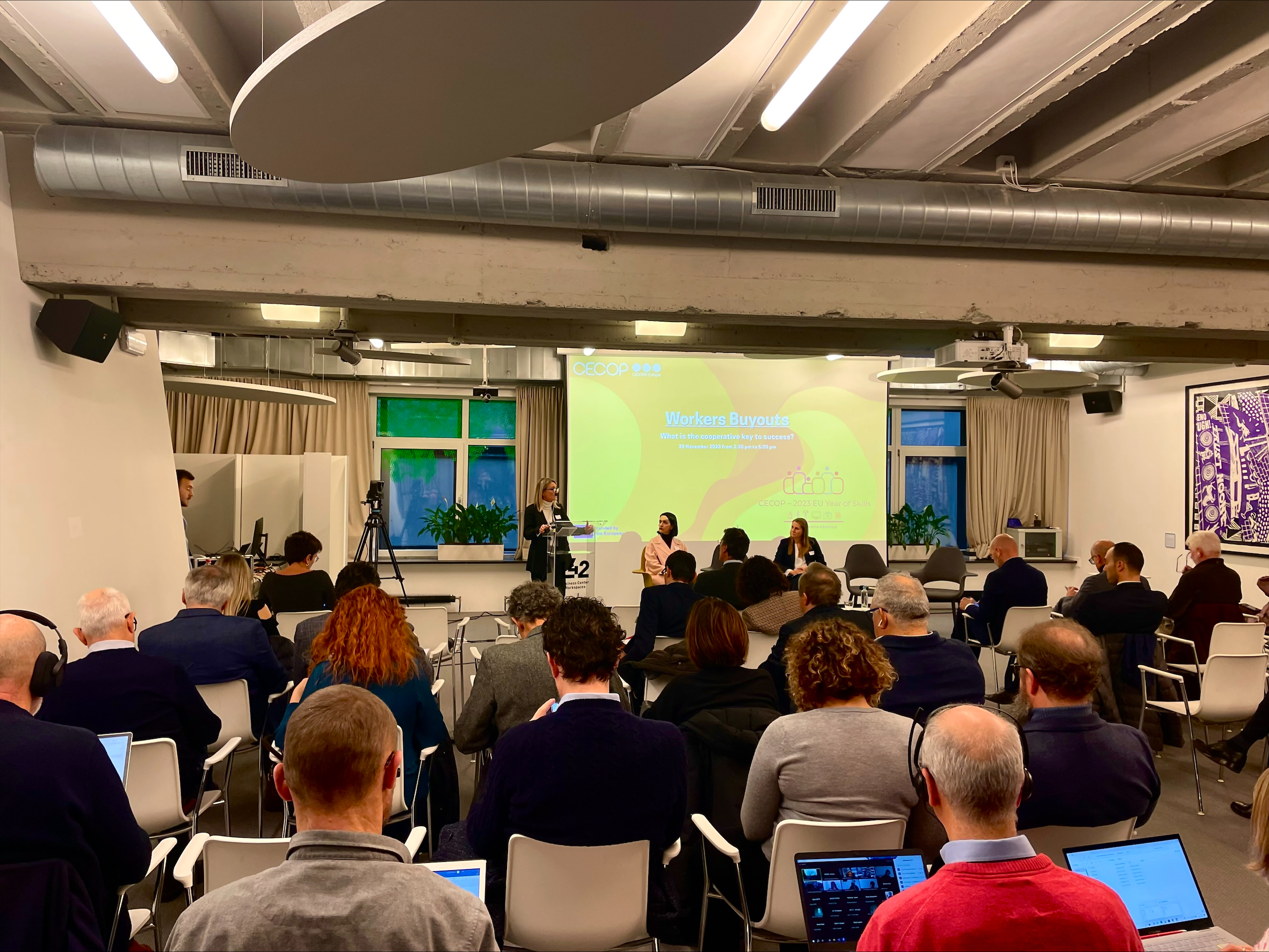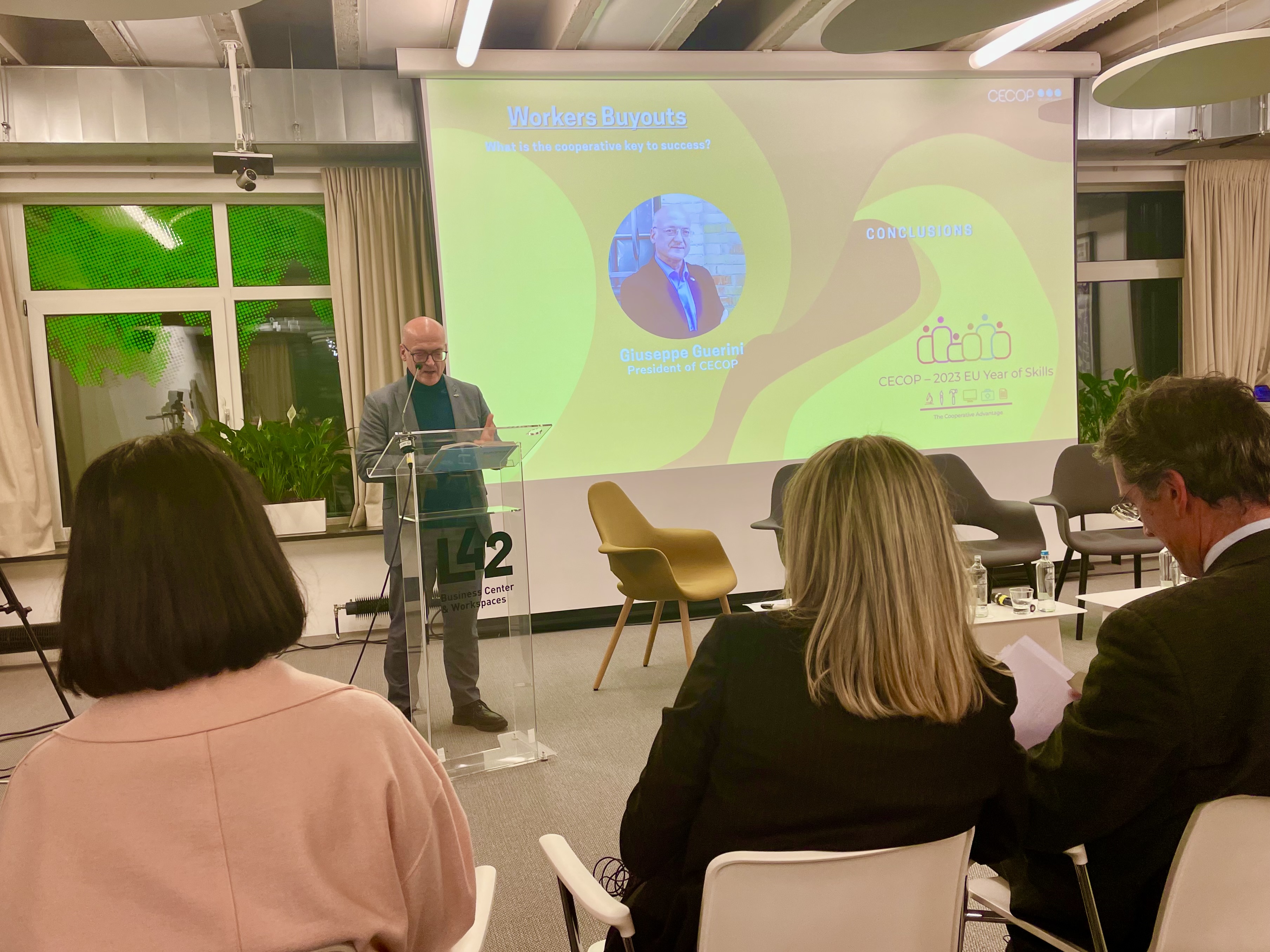Last 29 November, CECOP organised the conference “Workers Buyouts - what is the cooperative key to success?", the event that stood for the flagship initiative of CECOP’s 2023 skills campaign in the framework of the European Year of Skills.
The event aimed to look at the support system provided by the cooperative movement, the know-how, technical, and human expertise it encompasses to make workers buyouts successful and sustainable in the long term.
The programme was divided into two sections: a more institutional part presenting the state of the art on workers buyouts (WBO) in the EU, and a second part composed of panels that shed a light on the existing supporting mechanisms provided by the cooperative movement that enable successful WBOs.

Introduction
Francesca Montalti, responsible for the industrial sector in Legacoop Produzione e Servizi and vice-president of CECOP, introduced the conference by highlighting the importance of worker buyout in overcoming financial crisis and in preserving jobs and skills through the cooperative model.
Santina Bertulessi, Deputy Head of the Cabinet of Nicholas Schmit, followed up by provided the institutional perspective by recalling the European Commission’s commitment to ensure the dialogue with social economy partners and keep social economy on top of the agenda. For instance, she underlined the adoption of the new 2021 Social Economy Action Plan and the Council adoption of the Recommendation on promoting enabling frameworks for the social economy in October 2023. Both initiatives encourage member states to put forward concrete measures in order to facilitate and support WBOs.
To address the limited access to debt financing for WBO in the form of cooperative, Miglena Dobreva from the European Investment Bank (EIB) provided some insights and findings from the Fi-Compass study on financial instruments to support worker buyouts. She offered an overview of the financial needs necessary to mobilise resources for WBO with focusing on cases of Italy, France, Spain and Slovenia. The study looked at the combination of tailored financial instruments for WBOs from the cooperative movement with other complementary financial sources. Among the next steps, she pointed out that the EIB will assess further the potential of financial and advisory products to support the WBO using the ESF+ and other EU level instruments.
Mauro Frangi, President of Cooperazione Finanza Impresa (CFI), offered an interesting overview of almost 40 years of the phenomenon by displaying the importance of the Italian Marcora Law which was approved in 1985 and established the CFI Fund intended to safeguard employment through WBOs. He underlined the reasons of the law’s success and the advantages of the cooperative model. CFI was born from the idea of putting this law into practice and, in fact, it intervenes as financial partner to invest in workers’ skills and finance the growth of cooperative enterprises.
Panels

The two following panels discussed the supportive environment cooperatives created to enable the success of worker buyouts, from diagnosis phase, to the training provided to the new workers-owners. The panellists underlined some challenges, such as the lack of knowledge and expertise among professionals involved in business transfers and liquidation procedures, and the poor access to advisory services and financial resources.
The first panel presented successful supportive practices. Meryem Yilmaz from Cooperatives Regional Union Auvergne Rhone Alpes (France) focused on the “early pre-transfer phase” and the importance of awareness raising among managers that will potentially sell their business in the coming years. She presented the media campaign they ran in that direction.
Paloma Tarazona highlighted the work her organisation, FEVECTA (Regional Union of Cooperatives in Valencia, Spain), provides to facilitate WBOs, including advisory services, training for workers-members and access to capital. A key to the effectiveness of their works is that they offer specialised support system depending on the region the WBO is from.
Denis Cagnin from Legacoop Veneto (Italy) explained how his organisation assists workers from the initial phase of WBO (administrative, fiscal, financial, and legislative services) until supporting the growth of newly established worker cooperatives with the overall objective: reduce the risk in order to guarantee the successful and sustainable WBOs.
Lastly, Alex Bird, researcher and founder of union-coops:uk (UK) went through the historic context of privatization of coal mines in the UK to emphasize the relevance of cooperatives. He presented the example of Tower Colliery in the South Wales Valleys as a successful WBO originating from the miners’ campaign to preserve their job.
The second and last panel outlined the complementarity between cooperative financial instruments provided at national level and European financial instruments. Aurélien Hiraux, Director of Financial Instruments and Investments at CGSCOP, also known as Les Scop, presented Les Scop network which identified WBO as “the strategic axe of the cooperative movement”. Les Scop, in fact, offers financial instruments to monitor and support cooperatives in their creation, development and worker buyout, trough their financial instrument SOCODEN.
Andrea Ruberti, Chief Financial Officer of CFI, marked that CFI uses risk capital and debt capital and it works with the European Investment Fund and the European Commission to encourage the entry of qualified investors into smaller social enterprises to support WBOs projects.
Both SOCODEN and CFI have signed with the EIF the EaSI Guarantee Instrument, funded from the EaSI Programme, dedicated to social entrepreneurship.
Conclusion
The conclusion from the conference is that there is a great untapped potential for WBO across Europe but also a big heterogeneity when it comes to its development across member states. The speakers agreed that the key to success lies in the supportive ecosystem that include tailor-made financial instruments and advisory services. Regional, national and European support is necessary in complementarity to the support provided by the cooperative movement. In fact, the cooperative movement cannot take upon its shoulders all the costs WBO require. Saving jobs and economic activity should be at the core interest of the EU. “We need to move from profit maximisation to value creation to enable a new ecosytem” said CECOP President Giuseppe Guerini in his concluding remarks.

| Read the full report |
|
This event has been funded by the European Union. Views and opinions expressed are however those of the authors only and do not necessarily reflect those of the European Union or the European Commission. Neither the European Union nor the granting authority can be held responsible for them. |
 |









